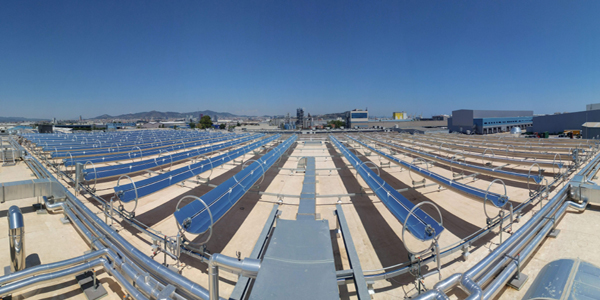Quebec cleantech company keeping an eye on Europe
Rackam’s strategy to target Europe with its clean‑technology solutions didn’t come about by accident. Quebec’s clean‑energy regulations made it a natural market for the Valcourt’s company, which specializes in solar thermal technology.

Rackam's installation in Barcelona
Photo: Rackam
Choosing Europe as their niche market
Rackam was established in 2009 with technology that uses the sun’s energy to fuel industrial heating systems and processes. It designs, manufactures and supports solar projects in the industrial production, agriculture and municipal sectors. These are intended to reduce the consumption of hydrocarbons and reduce the environmental footprint of customers and partners.
Now the Canada–EU Comprehensive Economic and Trade Agreement is making it even easier and more lucrative for Rackam to do business there, especially with the assistance and programs of the Canadian Trade Commissioner Service (TCS).
“We are definitely keeping an eye on Europe,”
says Joséanne Bélanger‑Gravel, the company’s business development director. “What happens there first then follows elsewhere in the world, especially around concentrated solar power.”
Instead of using fossil fuels for industrial heating, drying, cooling and refrigeration systems, Rackam’s systems use automated, sun‑tracking parabolic mirrors to collect and concentrate solar heat for thermal power. Unlike panels that produce electricity, the technology converts sunlight to heat that replaces the combustion of fossil fuels, which lowers greenhouse gas emissions.
Bélanger‑Gravel says the company “started seeing a change in Europe around renewable energy. It is a bit more advanced.”
Europe is especially an important market for Canadian cleantech exporters due to regulations that make it easier to do business in the region. Rackam focused on Spain specifically because of its special programs that encourage the use of solar energy, such as in Barcelona, which has rules requiring a minimum of energy to be solar.
“When you have regulations like that it helps a lot,”
Bélanger‑Gravel says. “Most of the researchers and specialists on concentrated solar power are also in Spain, so that’s where it especially happens.”
Today the company has 12 projects around the world, including in other EU countries such as Greece and Portugal.
Adapting to COVID‑19
The COVID‑19 pandemic has been a time of transition for Rackam, which has pivoted its efforts to developing contracts and is focusing on demonstration projects in Quebec.
The team assists and guides clients with financing options and is able to apply its expertise and specialized equipment to solving manufacturing problems in the local area.
She admits going through difficult times, with lost revenues from international sales and services, which is especially a concern with the long sales cycles and large amounts involved in the infrastructure projects that the company usually works on.
“We are working a lot and following up with leads,”
she says. Meanwhile Rackam is working on developing systems so it can do more work with global clients remotely, for example through online demonstrations, service calls and data monitoring.
Resilience and lookahead
“Our team is very passionate; we put countless hours into solving problems and innovating,”
says Bélanger‑Gravel with pride. “That’s a great strength of Rackam. Our team believes in this technology, and it’s beautiful to see.”
Rackam’s products focus on lowering greenhouse gas emissions and “answering a real need of the client,” Bélanger‑Gravel says. The company has carried out studies to better understand the needs of clients, for example developing new projects for specific needs in greenhouses.
That being said, there is “definitely interest in Europe…especially in Spain. We keep an eye on what’s happening over there—it’s the heart of concentrated solar power. There is also very good sun radiation”
, she confirms.
Rackam’s future plans include using its technology for water and sludge treatment in international businesses, as well as focusing on the food industry, where the use of thermal energy is well‑suited.
Subscribe to: CanadExport